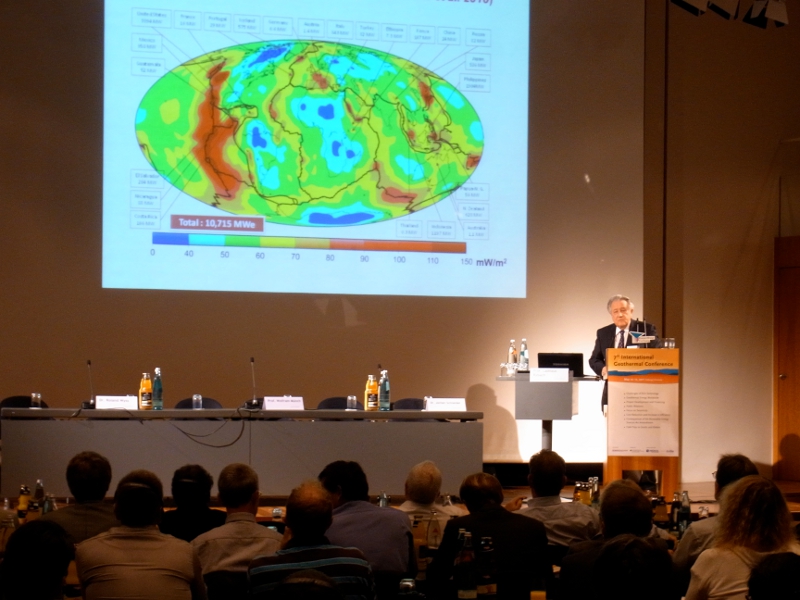International Geothermal Conference, Freiburg as center of sector for 3 days
With the 7th International Geothermal Energy Conference closing last week, organizers are pleased with more than 250 participants from 17 countries and many exhibitors at the event in Freiburg, Germany.
International Geothermal Conference: Freiburg as the center of the geothermal sector for three days. Last week the 7th International Geothermal Conference in Freiburg ended. The organizers’ conclusion is highly positive: With over 250 participants from 17 nations the interest in the potentials of deep geothermal energy is obviously. Among others, subjects of the conference have been EGS projects, the cost reduction of geothermal projects and the presentation of the progress report for the amendment of the EEG (Renewable Energy Sources Act) by the German Federal Environment Ministry.
The three-day 7th International Geothermal Conference (IGC 2011) had ended last week with field trips to geothermal power plants in Switzerland and France. Over 250 participants from 17 nations have used the opportunity to inform themselves about current political and technical developments in the geothermal sector and to discuss the perspective of the geothermal energy. Concerning the number of participants, this reflects an increase of 10%
compared with the conference in 2010.
“This trend and the increasing numbers of international participants are showing the growing interest in the geothermal energy sector in common and especially the development in Germany”, says Dr. Jochen Schneider, chief executive officer of Enerchange, the agency responsible for the organization of the event. He sees the IGC as an established exchange platform for the international geothermal sector.
One of the main subjects on the first conference day has been the realization of EGS projects – projects that are using the rock base in a depth of 3000 to 5000 meters as a heat exchanger. This technology has only been shown at demonstration projects so far, but from experts point of view has a high potential for future power generation. “Particularly with regard to the use of domestic sources of energy, there has to be a strong focus on the development of the EGS technology”, said Dr. Ernst Huenges from the Geoscience Research Centre in Potsdam.
In the afternoon of the first conference day there had been workshops dealing with public relations, pump technology, geothermal projects worldwide and the use of GeotIS.
The second conference day had focused on different discussions forums dealing with the technical, financial and political challenges of the geothermal energy. One special subject e.g. was the forum “cost reduction and increase in efficiency”. Beyond others Guillaume Becquin presented the research of General Electric in high efficient working fluids and cycle processes in geothermal power plants. His conclusion: “An increase in efficiency
of 30 – 50 % is possible”. Another central topic of the second day was the challenges of seismic activities during geothermal projects. Last but not least, Cornelia Viertl from the German Federal Environment Ministry (BMU) presented the new plans of the BMU for the geothermal feed in tarifs of EEG (Renewable Energy Sources Act). She made clear that the BMU is recognizing the potential of geothermal energy for power generation and therefore
suggest an increase of the basic remuneration, as well as a subsidy for the drilling costs.
“The deep geothermal energy is an interesting part of the renewable energy mix, because of its potential for covering base load demands. That is reflected in different energy scenarios. This year’s conference has shown, that there are ways to use the potential of this energy in
the next decades”, says Marcus Brian, chief executive officer of Enerchange.
More than a dozen companies were using the conference to demonstrate their products and services to the professional public. One of the exhibitors and sponsors of IGC was the french company Cryostar, which is focusing on high efficiency heat exchangers, also used in geothermal power plants. Other exhibitors have been from Canada, Poland and Germany. Like every year also the attractive supporting programme also has been very well received. Beside the Opening Lounge on the first night, the participants took part at the business dinner on the eve of the second day to network in a relaxed atmosphere.
The International Geothermal Conferece is organised by the agency Enerchange. The Freiburg Wirtschaft Touristik und Messe GmbH & Co. KG as the economic development and marketing company of the city is co-organiser of the conference. Patronage is the ‘Federal Environment Ministry, supporter of the European Association of Geoscientists & Engineers (EAGE). As cooperation partners occurred the German Energy Agency (dena), the International Geothermal Association (IGA), the Wirtschaftsforum Geothermie, the Swiss Geothermal Association (SVG) and the German Geothermal Association (GtV).
The programme of the conference can be found on www.geothermiekonferenz.de.


















